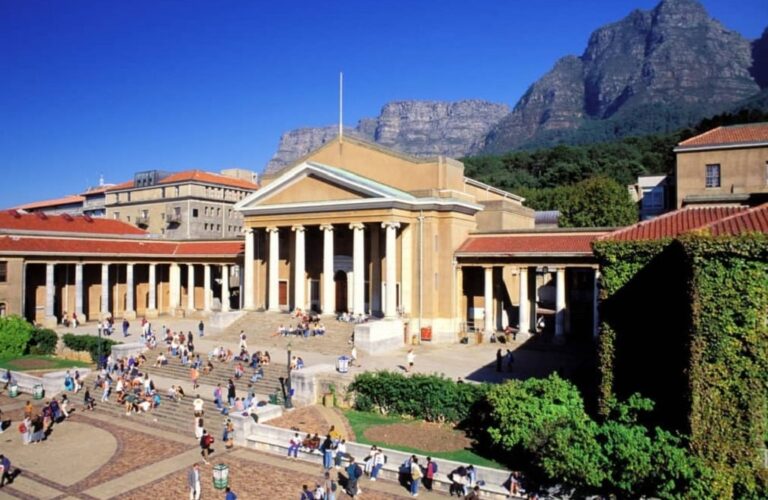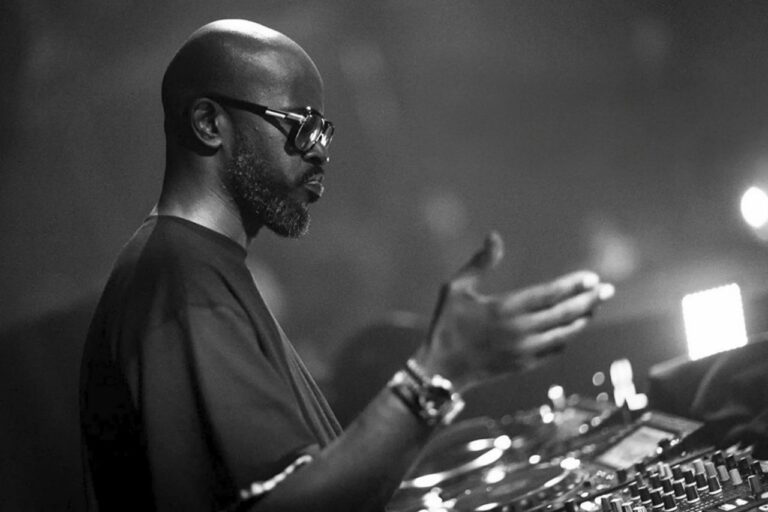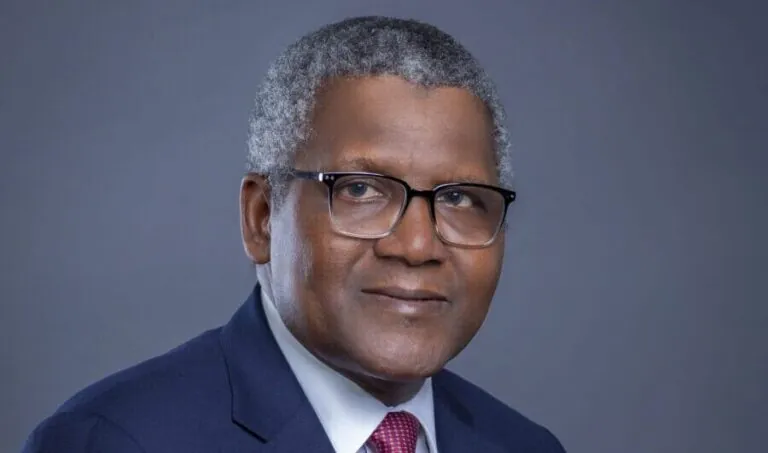In Nigeria’s vibrant economy, marked by its rich cultural heritage and diverse resources, the disparity in wealth is significant. Despite facing numerous challenges, Nigeria boasts some of the wealthiest individuals in Africa.
As Africa’s largest economy, Nigeria presents a mix of traditional industries and vast oil wealth, which has influenced its economic dynamics positively and negatively. Beyond oil, other sectors like telecommunications, cement, and manufacturing are creating new wealth avenues.
This ranking, derived from reputable financial sources, highlights the net worth and achievements of these individuals and their roles in Nigeria’s economic development.
1. Aliko Dangote
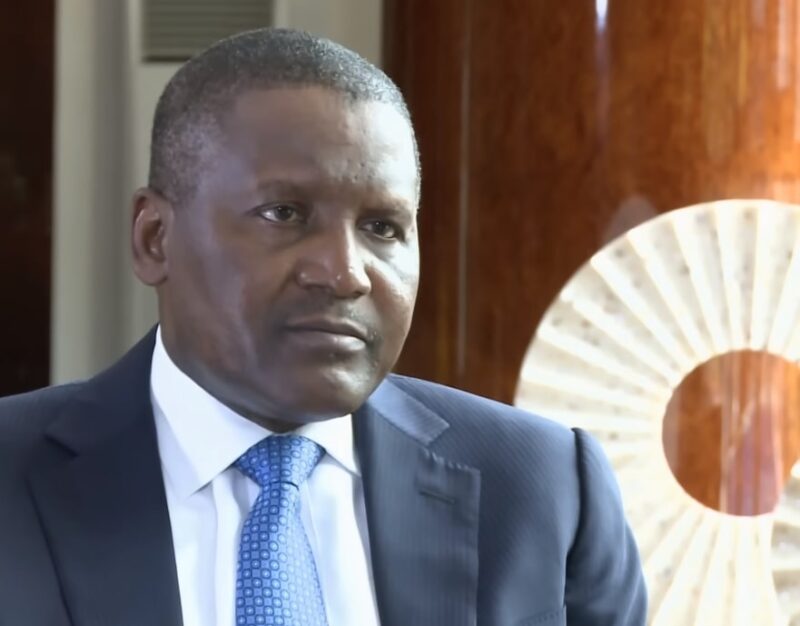
- Net Worth: $13.7 billion
- Source of Wealth: Cement, Sugar, Flour
Aliko Dangote, an icon of African business, has built a $13.7 billion empire, focusing on essential commodities like cement, sugar, and flour. His conglomerate, Dangote Group, significantly boosts Nigeria’s economy and job market.
Beyond his commercial ventures, Dangote is deeply involved in philanthropy, with a strong focus on health and education initiatives, reflecting the depth of his impact beyond the boardroom.
2. Mike Adenuga

- Net Worth: $6.5 billion
- Source of Wealth: Telecommunications, Oil
Mike Adenuga, with a net worth of $6.5 billion, has been a game-changer in Nigeria’s telecom landscape through his company, Globacom. Challenging global giants, he has redefined the sector while also making significant strides in the oil industry with Conoil.
3. Alafaa Kariboye-Igbo
View this post on Instagram
- Net Worth: $6.1 billion
- Source of Wealth: Real Estate, Oil, Entertainment
Alafaa Kariboye-Igbo, also known as “Oil Money,” has diversified his portfolio into real estate, oil, and entertainment, amassing a fortune of $6.1 billion. His journey from modest beginnings to becoming one of Nigeria’s wealthiest individuals is inspirational, offering hope to many in a narrative of perseverance and success.
4. Abdulsamad Rabiu
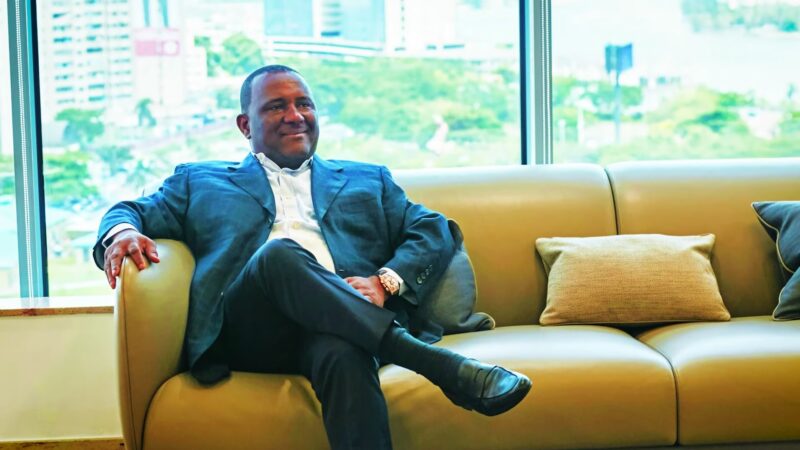
- Net Worth: $5.9 billion
- Source of Wealth: Cement, Sugar, Real Estate
Abdulsamad Rabiu heads the BUA Group, a conglomerate active in cement production, sugar refining, and real estate, which has propelled him to a $5.9 billion net worth. His business achievements go hand in hand with his commitment to social welfare, demonstrating a balanced approach to wealth creation and community support.
5. Arthur Eze
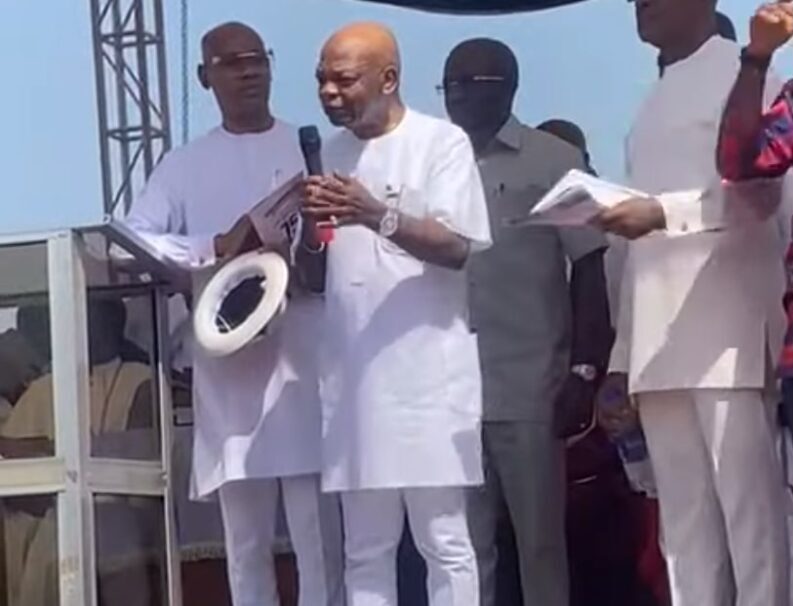
- Net Worth: $5.8 billion
- Source of Wealth: Oil, Aviation
Arthur Eze, with a fortune of $5.8 billion, has made his mark in the oil and aviation sectors. His company, Atlas Oranto Petroleum, holds significant oil reserves across Africa, highlighting the continent’s potential and Eze’s foresight in tapping into these resources.
6. Cletus Ibeto

- Net Worth: $3.8 billion
- Source of Wealth: Conglomerate
Cletus Ibeto’s ascent from importing auto parts to leading one of Nigeria’s largest conglomerates showcases the dynamic nature of Nigerian entrepreneurship. With a net worth of $3.8 billion, his story underlines the transformative power of vision and determination in the business landscape.
7. Orji Uzor Kalu
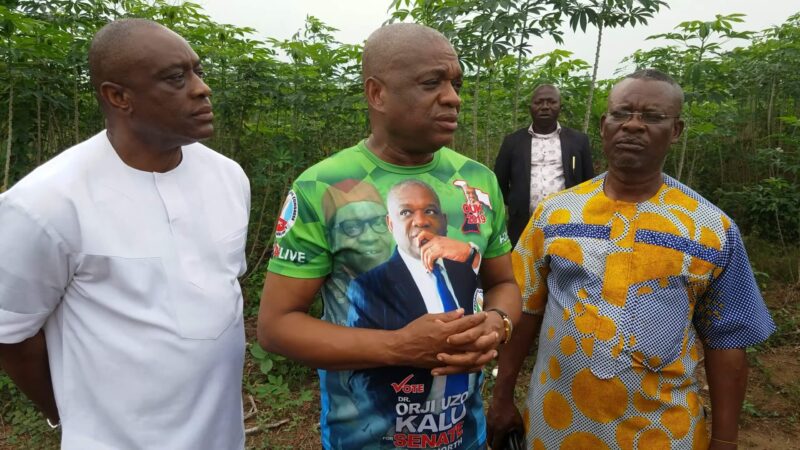
- Net Worth: $3.2 billion
- Source of Wealth: Manufacturing, Transportation
Orji Uzor Kalu, a figure of $3.2 billion net worth, merges business with politics, having made significant investments in sectors like manufacturing and transportation. His role extends beyond commerce into political leadership, having served as the governor of Abia State and now as a senator, illustrating the interplay between economic and political influence in Nigeria.
8. Emeka Offor

- Net Worth: $2.9 billion
- Source of Wealth: Oil, Philanthropy
Emeka Offor’s success in the oil industry laid the foundation for his substantial $2.9 billion wealth. Not content with financial success alone, Offor has dedicated significant efforts towards philanthropy, focusing on health and education to make a tangible impact beyond the business world.
9. Benedict Peters
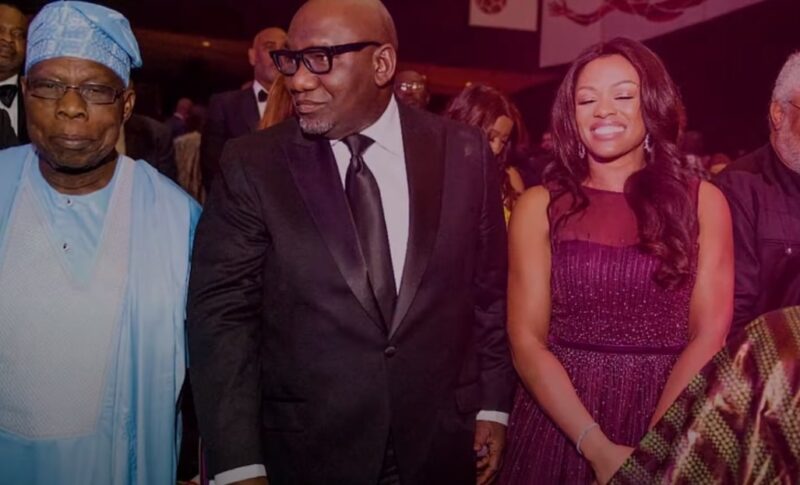
- Net Worth: $2.7 billion
- Source of Wealth: Oil
Benedict Peters has become synonymous with resilience and innovation in Nigeria’s oil landscape. His $2.7 billion fortune originates from founding the Aiteo Group, a testament to his significant role and influence within the oil sector, navigating its complexities and contributing to the national economy.
10. Andy Uba

- Net Worth: $2.1 billion
- Source of Wealth: Politics, Business
Blending politics with business acumen, Andy Uba’s narrative showcases the dynamic synergy between governance and entrepreneurship in Nigeria. His $2.1 billion net worth reflects a successful amalgamation of political influence and business ventures, highlighting the profitable nexus between the two realms.
11. Leo Stan Ekeh
View this post on Instagram
- Net Worth: $1.2 billion
- Source of Wealth: ICT
Leo Stan Ekeh has emerged as a visionary in Nigeria’s ICT sector, amassing a $1.2 billion fortune. His leadership at Zinox Group has positioned the company as a cornerstone in West Africa’s IT solutions market.
Meanwhile, his venture, Konga, has transformed the retail space in Nigeria, marking Ekeh as a key proponent of digital evolution.
12. ABC Orjiako
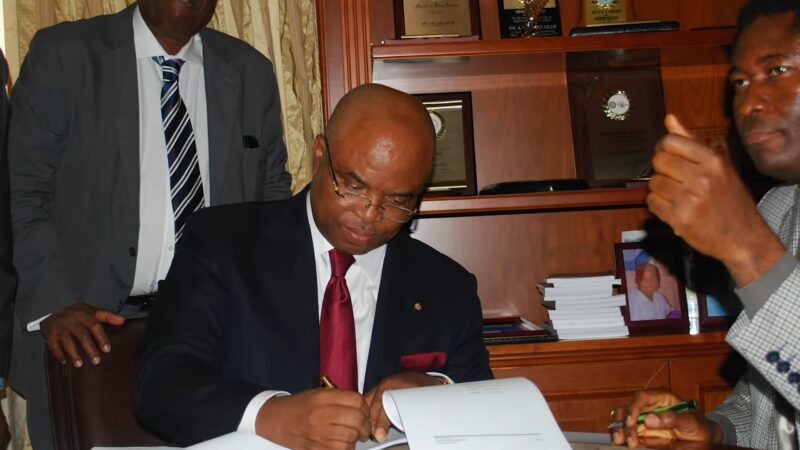
- Net Worth: $1.2 billion
- Source of Wealth: Oil and Gas
13. Femi Otedola

- Net Worth: $1.1 billion
- Source of Wealth: Energy, Real Estate
Femi Otedola’s evolution from a fuel magnate to a diversified entrepreneur showcases his ability to adapt to Nigeria’s changing economic landscape. Holding a net worth of $1.1 billion, Otedola’s strategic shift towards power generation and real estate reflects an insightful response to market dynamics.
14. Danjuma Theophilus

- Net Worth: $1.1 billion
- Source of Wealth: Military, Shipping, Petroleum
From a celebrated military general to a business mogul, Theophilus Danjuma’s life story is a testament to Nigeria’s multifaceted avenues for success. His $1.1 billion net worth, accrued through ventures like Nigeria America Line and South Atlantic Petroleum, highlights a significant contribution to both his wealth and the nation’s prosperity.
15. Jimoh Ibrahim
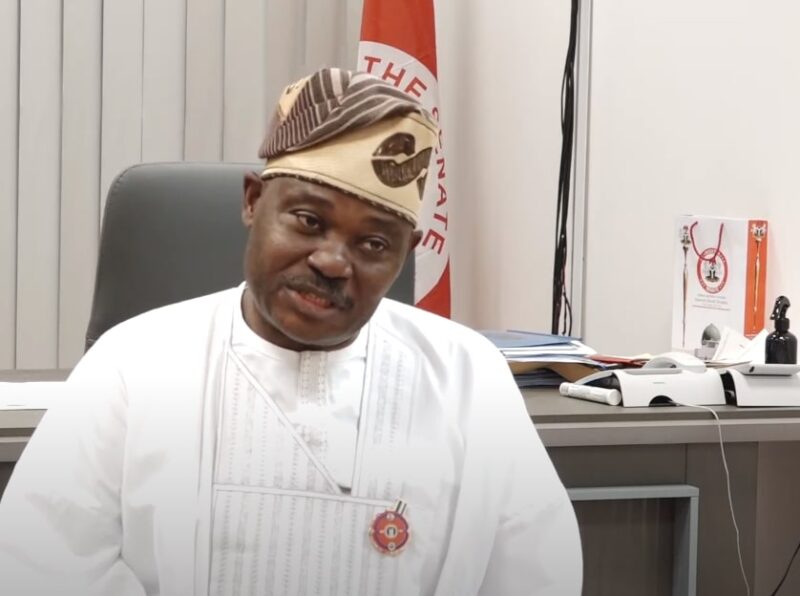
- Net Worth: $1.1 billion
- Source of Wealth: Diversified
Jimoh Ibrahim illustrates the strategic advantage of diversification in business. With a net worth of $1.1 billion, his investments span across sectors like hospitality, insurance, and transportation, showcasing a well-rounded approach to building wealth in Nigeria’s fluctuating economy.
16. Pascal Gabriel Dozie
- Net Worth: $1 billion
- Source of Wealth: Banking, Telecommunications
Pascal Gabriel Dozie, the mind behind Diamond Bank, has played a pivotal role in Nigeria’s financial sector, amassing a net worth of $1 billion. His foresight has extended into telecommunications, particularly with MTN Nigeria, underlining his significant impact on Nigeria’s economic and technological landscapes.
17. Folorunsho Alakija

- Net Worth: $1 billion
- Source of Wealth: Fashion, oil, real estate, and printing industries
Folorunsho Alakija is the richest woman in Nigeria and vice chair of Famfa Oil, with a stake in the offshore Agbami Oilfield. She started her career with a fashion label catering to high-end clients, including the wife of former Nigerian President Ibrahim Babangida.
Alakija is also known for her philanthropic efforts, particularly through the Rose of Sharon Foundation, which supports widows.
18. Igho Sanomi
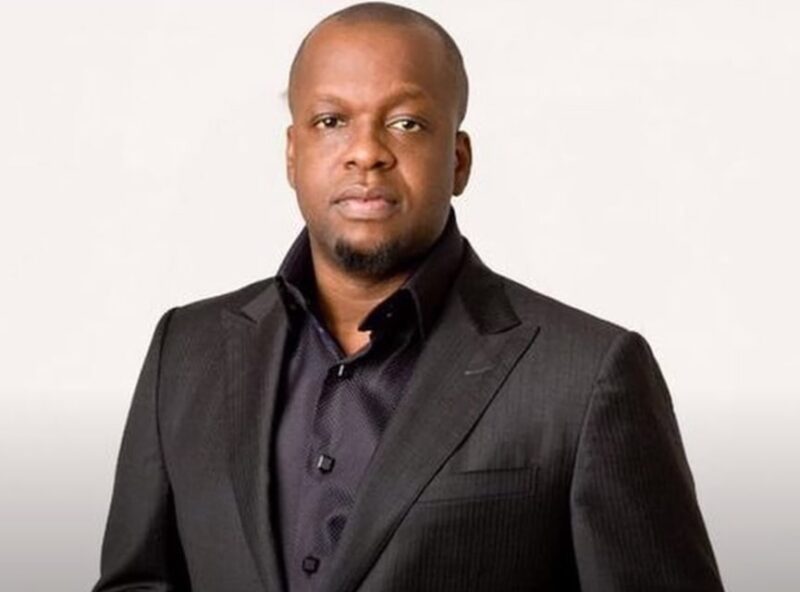
- Net Worth: $1 billion
- Source of Wealth: Telecommunications, shipping, aviation, and real estate
Igho Charles Sanomi is a notable businessman in Nigeria, also involved in public speaking and philanthropy. His business ventures span across various sectors, contributing to his significant wealth.
19. Jim Ovia
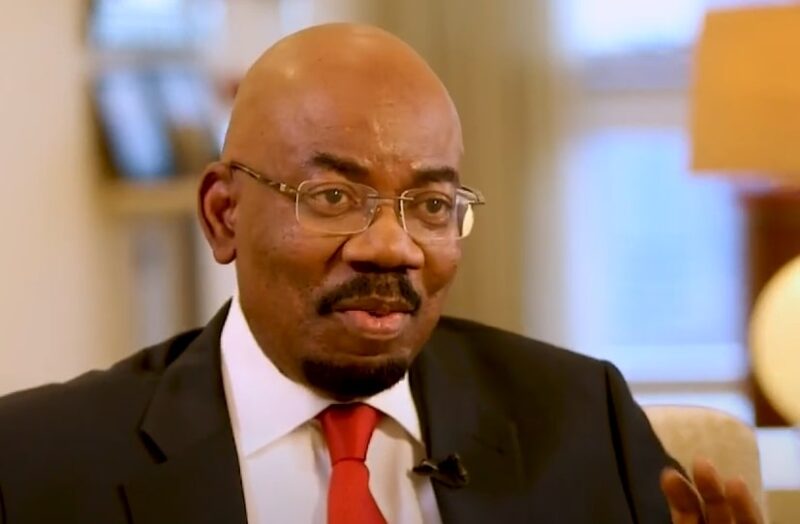
- Net Worth: $980 million
- Source of Wealth: Banking industry, telecommunications, property
Jim Ovia is the founder of Zenith Bank, one of Nigeria’s largest and most successful banks. He has significantly influenced the financial sector across Nigeria.
Ovia is also known for his philanthropic efforts, particularly through the Jim Ovia Foundation, which has awarded scholarships to over 1,500 students.
20. Tony Elumelu

- Net Worth: $700 million
- Source of Wealth: Investments in financial services, real estate, hospitality, healthcare, power, oil, and gas
Tony Elumelu is a prominent figure in the banking industry and the CEO of Heirs Holdings. He is known for his concept of “Africapitalism,” which advocates for the private sector’s commitment to Africa’s development through long-term investments.
Elumelu’s contributions to business and philanthropy have earned him several accolades and awards.
21. Segun Agbaje
View this post on Instagram
- Net Worth: $100 million
- Source of Wealth: Banking
Segun Agbaje is the CEO of Guaranty Trust Holding PLC, one of Nigeria’s largest financial institutions. He has a long-standing career in banking, starting from Ernst & Young in San Francisco before joining Guaranty Trust.
Agbaje has been instrumental in the bank’s growth and success, earning him the title of the highest-paid CEO in Nigeria in 2022.
FAQ
What are the main industries contributing to the wealth of Nigeria’s richest individuals?
The main industries include oil and gas, telecommunications, cement production, sugar refining, real estate, and manufacturing.
How has the telecommunications sector impacted the wealth of Nigerian entrepreneurs?
The telecommunications sector has significantly impacted the wealth of Nigerian entrepreneurs by providing a platform for massive growth and competition, as seen in the success stories of individuals like Mike Adenuga with Globacom.
What role does philanthropy play in the lives of Nigeria’s wealthiest?
Philanthropy plays a significant role, with many of Nigeria’s wealthiest, like Aliko Dangote and Emeka Offor, dedicating substantial parts of their fortunes to health, education, and social welfare initiatives.
How do political connections influence business success in Nigeria?
Political connections can significantly influence business success in Nigeria, as seen with individuals like Orji Uzor Kalu whose business ventures have been complemented by his political career, or Seyi Tinubu who was born into a politically influential family.
What challenges do Nigerian entrepreneurs face in accumulating wealth?
Nigerian entrepreneurs face challenges such as political instability, infrastructural deficits, regulatory hurdles, and economic fluctuations in accumulating wealth.
How has Nigeria’s economic landscape changed in recent years, and what impact has this had on new wealth creation?
Nigeria’s economic landscape has diversified beyond oil, with growth in sectors like ICT, retail, and services, creating new wealth avenues and opportunities for entrepreneurs like Leo Stan Ekeh and others in the digital space.
Final Words
Nigeria’s vibrant economy, marked by cultural diversity and natural wealth, displays significant wealth disparities. Despite challenges, it hosts some of Africa’s richest, showcasing the resilience and entrepreneurial spirit of its citizens.
These tycoons have influenced sectors from oil to telecommunications and technology, highlighting Nigeria’s vast opportunities. Their achievements, rooted in solid financial data, highlight their contributions to the country’s economy and societal development.




